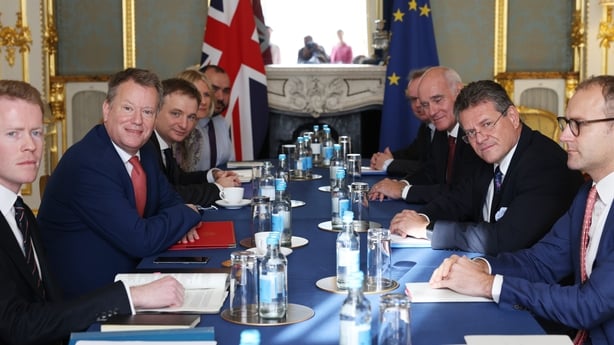"Serious headway" needs to be made in negotiations over the Northern Ireland Protocol in the next week, the European Union has said.
However, European Commission vice-president Maroš Šefčovič said there had been a "change in tone" from the UK during the latest round of negotiations.
It comes after the UK government appeared to soften its stance on using the protocol's get-out clause, describing Article 16 as a "legitimate part of the protocol's provisions" while stressing there was a "preference to find a consensual way forward".
At a press conference following the latest round of talks held in London, Mr Šefčovič said: "We can and must arrive at the agreed solution that Northern Ireland truly deserves.
"That is also why I raised forcefully that we need to make serious headway in the course of next week.
"This is particularly important as regards the issue of medicines.
"An uninterrupted long-term supply of medicines from Great Britain to Northern Ireland is the protocol-related issue on everyone's mind in Northern Ireland."
He also said there had been a "change in tone" from UK Brexit minister David Frost in the fourth round of talks held with the UK government.

Mr Šefčovič said: "I acknowledge and welcome the change in tone of discussion with David Frost today, and I hope this will lead to tangible results for the people in Northern Ireland."
He told reporters the UK needed to "reciprocate the big move the EU has made" on the Northern Ireland Protocol.
He said he was "convinced the issue of medicines could be a blueprint for how to approach and solve together the remaining outstanding issues" between the UK and the trading bloc.
Following the talks, a UK government spokesman said: "Lord Frost noted that there remained significant gaps to be bridged between the UK and EU positions.
"He noted that, as set out to the House of Lords on November 10, it remained the UK's preference to find a consensual way forward, but that Article 16 safeguards were a legitimate part of the protocol's provisions.
"Lord Frost also underlined the need to address the full range of issues the UK had identified in the course of discussions, if a comprehensive and durable solution was to be found that supported the Belfast (Good Friday) Agreement and was in the best interests of Northern Ireland.
"In this context, although talks had so far been conducted in a constructive spirit, Lord Frost underlined that in order to make progress, it was important to bring new energy and impetus to discussions."
Further meeting set for next Friday
The next set of talks will take place in Brussels next Friday.
The UK has set a December deadline for resolving the renegotiation of the protocol.
In October, the EU offered a series of alterations to the agreement, which is designed to maintain free-flowing trade on the island of Ireland without a hard border.
The agreement effectively keeps Northern Ireland within the EU single market, meaning that trade goods must be checked on arrival from mainland UK.
The EU has offered to cut out 80% of these checks, with the aim of helping businesses and the economy in Northern Ireland.
But the UK government is seeking further alterations to the agreement, including removing the role of judges in the European Court of Justice (ECJ) as the arbitrators of disputes.
On the role of the ECJ, Mr Šefčovič confirmed that "definitely nothing's changed" in the EU's position.
"Without the European Court of Justice jurisdiction, there is no access to the single market."
Byrne warns against 'tough guy' approach to protocol
Minister for European Affairs Thomas Byrne has said a "tough guy" approach when it comes to Northern Ireland will lead to "disaster".
Asked on BBC Radio 4's Today programme, if there is a serious danger of a full-scale trade war between the European Union and UK, Mr Byrne said: "There is a serious danger of complete instability in Northern Ireland and that's what motivates the Irish Government in all of our dealings in relation to the protocol."
Mr Byrne said the countries involved have worked together for decades to ensure stability, saying "we now have a division, it seems, because of threats by the British government to, what they say, is to suspend the protocol under Article 16. We're not entirely clear what that's about".
Challenged on instability in Northern Ireland and the current arrangements, he said: "I don't think that the people who are burning buses in Northern Ireland at the moment ... are fully aware of all of the details and the intricacies of the protocol.
"What they need to see, and what people in Northern Ireland need to see, is both governments working together."
He said the EU has listened to the concerns of Northern Ireland and is in "solutions mode", adding: "A tough approach, or a tough guy approach, when it comes to Northern Ireland can only be counter-productive and will lead to disaster."
Mr Byrne said he is "very glad despite that gloomy atmosphere" that there are talks taking place today, adding "there is a prize of stability and peace in Northern Ireland" as well as continuing good diplomatic relations between Britain and the EU.
Listen: Brexit Republic
Meanwhile, the Government has held talks with US President Joe Biden's administration about the protocol.
Yesterday Minister for Foreign Affairs Simon Coveney said contact with the US government was designed to "encourage progress" in negotiations.
"I've been speaking to the Biden administration directly" Mr Coveney told the Dáil.
"I got a chance to to speak to one of his most senior advisors this week, and also speaking to members of Congress in COP - Brendan Boyle and others.
"But I think the main focus here is to try to encourage progress in the vice-President Šefčovič/Lord Frost discussions."

